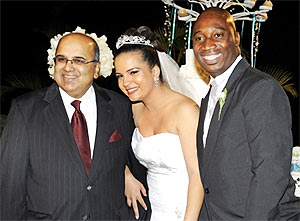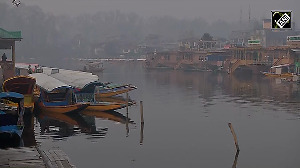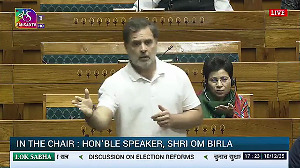 'Who am I to say that the happiness of individuals is any less significant than Memorandum of Understandings signed between governments?'
'Who am I to say that the happiness of individuals is any less significant than Memorandum of Understandings signed between governments?'
Ambassador B S Prakash on a romance that bloomed at a meeting of governments.
"Does anything ever come out of these meetings?" a younger colleague at our embassy in Brazil was asking me the other day as we sat around for hours in a meeting on climate change of BASIC countries, a recent grouping of South Africa, Brazil, India and China.
I find that the younger diplomats are relatively restless and impatient in an age of texting, teleconferencing and networking through Facebook. The traditional form and choreography of multilateralism is more like the Manipuri style of our dance, slow and cyclical rather than like the Brazilian Samba, fast and with a finale.
"You should learn to be patient," I advised him. "We are all sovereign countries, it is a difficult issue and we cannot expect quick outcomes."
Global warming, after all, is a question of centuries of incremental change and you cannot expect results in days, I wanted to tell him, but it does not do to joke about so serious a matter.
I did tell him, however, about the old joke about the UN body -- United Nations Conference on Trade and Development -- UNCTAD, which was normally expanded as 'Under No Circumstances Take Any Decision'.
"OK. Sir, let me ask you this. Have you ever seen any useful results out of such meetings?" he persisted.
"Depends on what you mean by useful. You never know," I said smiling. I was remembering the most tangible outcome that a dull IBSA (India, Brazil and South Africa) meeting had produced and that too very recently.
For the result, see the photograph with my column, posted with the consent of the couple getting married, I hasten to add, before someone accuses me of violating privacy, a holy cow these days.
What do you see? A happy couple: Hadassah, the beautiful Brazilian bride and John, the handsome South African groom and yours truly, the Indian karta 'agent' in an indirect sense, all grinning happily in front of the wedding cake.
This is the most solid evidence of the good coming out of IBSA that I have seen.
Before I dwell into the tale of this wedding, like a good bureaucrat I must start with the background, the nature of IBSA and the character of its meetings.
Of the multiplicity of multilateral forums that we see today, BRIC, G-20, BASIC and others, just to take those involving Brazil and India alone, IBSA is unique. It owes much to the vision of Brazilian President Lula who dreamed it up about seven years ago.
Lula's concept was simple and noble. It was a recognition that among the more than hundred developing countries from the continents of Asia, Africa and Latin America, the three countries of India, Brazil and South Africa had certain common attributes and characteristics.
To start with the factual, all the three are geographically big and have substantive populations on an international scale. In the three continents, they are big economies too, with Brazil and South Africa at the top of the list in South America and Africa.
Of course, China is a bigger economy than India in Asia, but does not fit in some other categories, which I mention below. Though they all are 'developing' and are thus different from the developed countries of Europe or Japan or North America, they are nevertheless more developed than others from their region.
All the three have an industrial base, manufacturing abilities, and well-established science and technology centrEs. But besides these factual details of commonality, they also share values and beliefs.
First, all the three are universally acknowledged as mature democracies. Second, they all have considerable diversity, ethnic, religious, cultural and even racial.
South Africa's racial profile as a rainbow nation is well known to us. Less known is Brazil's multi-racial mix ranging from Brazilians of European, African, Japanese and Arab origin.
Brazilian mix of ethnicities is amazing in that it has the largest Japanese community outside Japan and a larger Lebanese community than the present population of Lebanon! This is apart from more than 40% of Brazilians with African blood, and so many with different European antecedents: Not only Portuguese, but Italian, German, Czech, Greek and others. All speaking only Brazilian Portuguese and all rooting for their football team.
This then was the origin of the IBSA concept. The validity and the utility of the idea was soon seen by India and South Africa and the forum was established in 2003.
What has happened since then? Many things, but I must admit, also many meetings. At the international level IBSA takes common positions on global issues whether it is the expansion of the Security Council and representation for countries including Brazil and India or defending our interests in the World Trade Organisation, or demanding a greater voice at the World Bank/IMF.
But this apart, the three countries are also putting together a programme to learn from each other and to do things together in areas which affect them say urban squalor, regional disparities, educational needs.
It is remarkable to see how similar to our own problems those faced by Brazil and South Africa are, and yet how different the approaches can be. It is this aspect, which brings together the experts.
Getting impatient with how the wheels of international discussions move? I should now revert to the more personal story of Hadassah and John, departing from the official narrative.
Last year we had some meetings of what are called 'IBSA working groups', though my younger colleague might have questioned the use of the word 'working'!
As it happened the meetings were held in the city of Rio de Janeiro, and we in the embassy got ready to receive the full component of Indian bureaucrats and experts.
One of the groups concerned 'Women'. Rightly so. Like in India, in Brazil and South Africa too, empowerment of women is an important subject with vociferous representatives holding forth on gender sensitivity, 'quotas', equal opportunity and such like.
As it happens with governments and bureaucracies, not only with us, but in all countries, we were told at the last minute that none of the three women who were to represent India could come, because of 'austerity'.
The embassy was told to represent India. My colleagues, all men, got ready to do so on the basis of the background briefs sent to us, but we decided to have in our team a woman too, a woman who at least knew the Brazilian perspective and could also provide some gender balance to our team.
It is thus that Hadassah, the very intelligent and capable Brazilian secretary in our embassy, came to be a part of the Indian team in Rio.
Now Rio is a romantic city. Its famed beaches with enticing names -- Copacabana, Ipanema, its lush rainforests next to the ocean, its granite hills dramatically jutting out of the sea, its relaxed people frolicking throughout the day, let alone the night, its bars and barbeques.
No wonder, it is the favoured destination for international conferences and conventions. Its magic is what made Rio to be the choice for the Olympics and the World Cup, all in the next four years.
In the South African delegation was Mr John Mogashoa from their department of culture. All the IBSA delegates were busy and occupied, but I suspect Hadassah and John were even more occupied or should I say preoccupied?
If the spirit of IBSA is all about friendships and partnerships, something had to happen. The seed of IBSA had to flower in Rio. A few months later, Hadassah broke the news to me, her employer.
India was instrumental in this marriage between Brazil and South-Africa, she said. 'Amen' was all that I could say.
She has now left us and Brazil, and is busy setting up a new home in Pretoria.
Who am I to say that the happiness of individuals in an essentially private space is any less significant than Memorandum of Understandings signed in public between governments?
Image: Ambassador B S Prakash, left, with Hadassah and John at their wedding.
B S Prakash is India's Ambassador in Brazil and can be reached at ambassador@indianembassy.org.br





